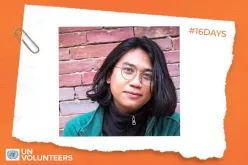As the 16 days of activism against gender-based violence 2021 is coming to an end, it is high time for us to broaden our approach to be more intersectional and to cover a diverse range of experiences in our society. Read more about how Dia Yonzon, a national Youth UN Volunteer working in the capacity of Youth Programme Support Officer, sees gender-based violence from a queer perspective.
Historically, the accounts of gender-based violence have left behind the non-binary experience that is a grappling reality for many individuals living with and among us.
In the context of Nepal, violence against trans and non-binary persons are adversely affecting the daily life of people. Yet, seldom do we find coverage in the mainstream media and resources are difficult to access for help.
Still the question begs to be asked: how can we eradicate these harmful practices if we don’t even talk about trans and non-binary persons or use our platforms to allow people to find their voices?
In order to find answers to these questions, in 2020, I spent 11 months as a trainee to the Deputy Representative of UN Women Nepal. In my time, I began experiencing how the heteronormative gender binary was institutionalized as the default within our society. I found myself primarily occupied in untangling and figuring out where I fit and later, I decided to rejoin the same agency as a national Youth UN Volunteer working in the capacity of Youth Programme Support Officer.
I recall when the COVID-19 pandemic began getting severe and the UN in Nepal created the separate category - male and female - group forum and therapy; I found these spaces heavily catered to hetero-binary needs.
To create safe spaces for trans and non-binary persons facing hate crimes during the pandemic, I co-founded Rainbow café with other queer staff and allies, an open platform for anyone to join and discuss or listen in about LGBTIQ+ related issues and topics. We brought in senior UN Staffs who were also queer to talk and share their experiences with younger and newer UN Staffs who were navigating their places in the system.
"Looking at gender-based violence from a queer perspective, I believe language is essential both as a communication tool and as the system's blueprint - as it's the first step forwards inclusion.
Indeed, in ending gender-based violence, our language should acknowledge the experiences of trans and non-binary individuals. And rather than fitting people's diverse experiences as an afterthought, I urge people to collect stories as valuable data for future inclusion, like what we are doing with Rainbow café.

